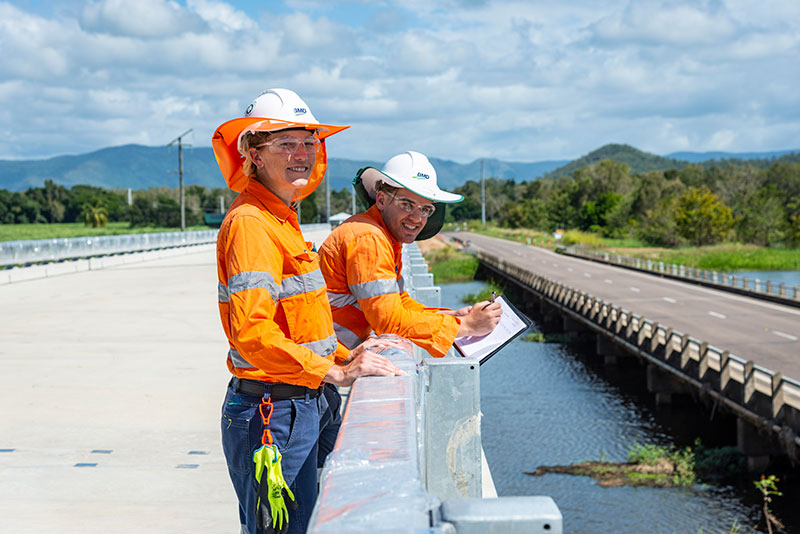National Water Week spotlight series: Ajay Sharma
National Water Week is making a splash across Australia this week with this year’s theme, ‘United by Water’. Taking place from October 16-22, National Water Week encourages individuals, communities, schools and organisations to be inspired to promote the importance of water.
At BMD, we’re making major waves in the water and wastewater sector which is why we’re excited to shine a spotlight on our people working across our many water projects nationally.
We have a long history of delivering effective and resilient water and wastewater infrastructure projects and our specialist teams work with our clients to offer industry leading technologies and treatment processes.
Meet Ajay Sharma, Project Manager and currently part of the Western Treatment Plant project team.
Q: It’s National Water Week and we are shining a spotlight on BMD’s growth in the water sector. What do you enjoy about working in the water sector and the role you have in being part of the solution?
A: I enjoy working within the water and wastewater construction industry. It’s a relatively small sector that requires close collaboration among various stakeholders, including water authorities, design engineers, environmental organisations, and technology experts. What I particularly relish is the opportunity to collaborate with a diverse group of professionals who share a common goal, which is highly rewarding from a professional perspective.
My role typically spans the entire project lifecycle, from the initial design stage to procurement, construction, commission, and subsequent operations and maintenance. This involvement in different project phases presents a wide array of professional challenges, keeping me consistently motivated and excited. Additionally, given the continuous advancements in water and wastewater technologies, I can stay at the forefront of technological developments. Contributing to environmental sustainability, public health, and making a positive impact on communities and the planet makes working in this sector incredibly fulfilling.
Q: What are some key water infrastructure projects you’ve been involved in, and how have they contributed to the bigger picture of water resource management?
A: I have played a pivotal role in several key water infrastructure projects, one of which is the 160S Nutrient Removal Plant at the Western Treatment Plant in Melbourne, Victoria. This new secondary treatment facility, fully commissioned in 2019, processes approximately 140 megalitres of sewage daily. It significantly enhances the Western Treatment Plant’s capacity to treat nearly half of Melbourne’s sewage.
Presently, I am engaged in a project at Melbourne Water’s Western Treatment Plant. Here we are constructing a new secondary wastewater treatment plant capable of treating 150 megalitres per day. This project, awarded to BMD Constructions in 2022, is set to be completed by 2025. Its primary aim is to enhance the Western Treatment Plant’s capacity to meet regulatory obligations concerning the discharge of treated effluent into Port Phillip Bay. This is especially important given the rapid population growth in the Western suburbs of Melbourne, which results in increased sewage flows and loads into the treatment plant. The innovative plant utilises an advanced treatment process, to significantly reducing carbon and energy consumption, and make a substantial contribution to environmental sustainability.
Q: What advice would you give to aspiring civil construction engineers who are interested in specialising in water infrastructure projects?
A: The water and wastewater industry is a multi-disciplinary field that relies on interdisciplinary coordination and collaboration. To aspiring engineers looking to specialise in water infrastructure projects, regardless of their discipline (civil, mechanical, electrical, or chemical), here’s some advice to consider:
Develop a Comprehensive Understanding: Start by gaining a strong grasp of water and wastewater systems and processes, including water supply, treatment, and distribution.
Gain Practical Experience: Seek internships, undergraduate positions, or cooperative education opportunities with organisations or firms involved in water infrastructure projects. This hands-on experience is invaluable.
Build a Professional Network: Establish a robust professional network within the water infrastructure industry. Consider joining organisations like the Australian Water Association (AWA) to connect with industry professionals, attend conferences, and benefit from mentorship opportunities.
Stay Informed: Continuously keep up with the latest technologies, materials, and design approaches within the industry. Conferences and organisations like AWA provide excellent platforms for staying updated.
Maintain Passion and Commitment: Maintain a genuine passion for water-related issues and a strong commitment to providing safe, clean, and reliable water resources to communities. A strong sense of purpose can be a driving force behind your success in this field.
Back to news


